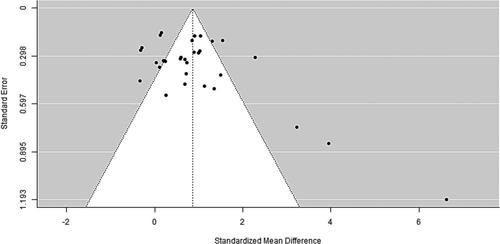Sleep problems are regularly reported in people with intellectual disabilities. Recent years have seen a substantial increase in studies comparing sleep in people with intellectual disabilities to control participants, with an increase in the use of validated, objective measures. Emerging patterns of differences in sleep time and sleep quality warrant pooled investigation.
A systematic search was conducted across three databases (Ovid Embase, PsycInfo and Medline) and returned all papers comparing sleep in people with intellectual disabilities to a control group, published since the last meta-analysis on the topic. A quality framework was employed to rate the risk of bias across studies. Separate meta-analyses of sleep duration and sleep quality were conducted. Subgrouping compared findings for those studies with participants with genetic syndromes or neurodevelopmental conditions and those with heterogeneous intellectual disability.
Thirteen new papers were identified and combined with those from the previous meta-analysis to provide 34 papers in total. Quality of studies was generally rated highly, though sampling provided risk of bias and adaptive functioning was rarely measured. People with intellectual disability associated with genetic syndromes or neurodevelopmental conditions sleep for shorter time periods (standardised mean difference = .26) and experience worse sleep quality (standardised mean difference = .68) than their peers. People with intellectual disability of heterogeneous origin show no difference in sleep time but have poorer sleep quality. There was some evidence that age moderated these effects.
People with intellectual disability have poorer sleep than those without. Subtle patterns suggest that aetiology of intellectual disability moderates the topography of these difficulties, with further work needed to differentiate common and distinct mechanisms across groups.


